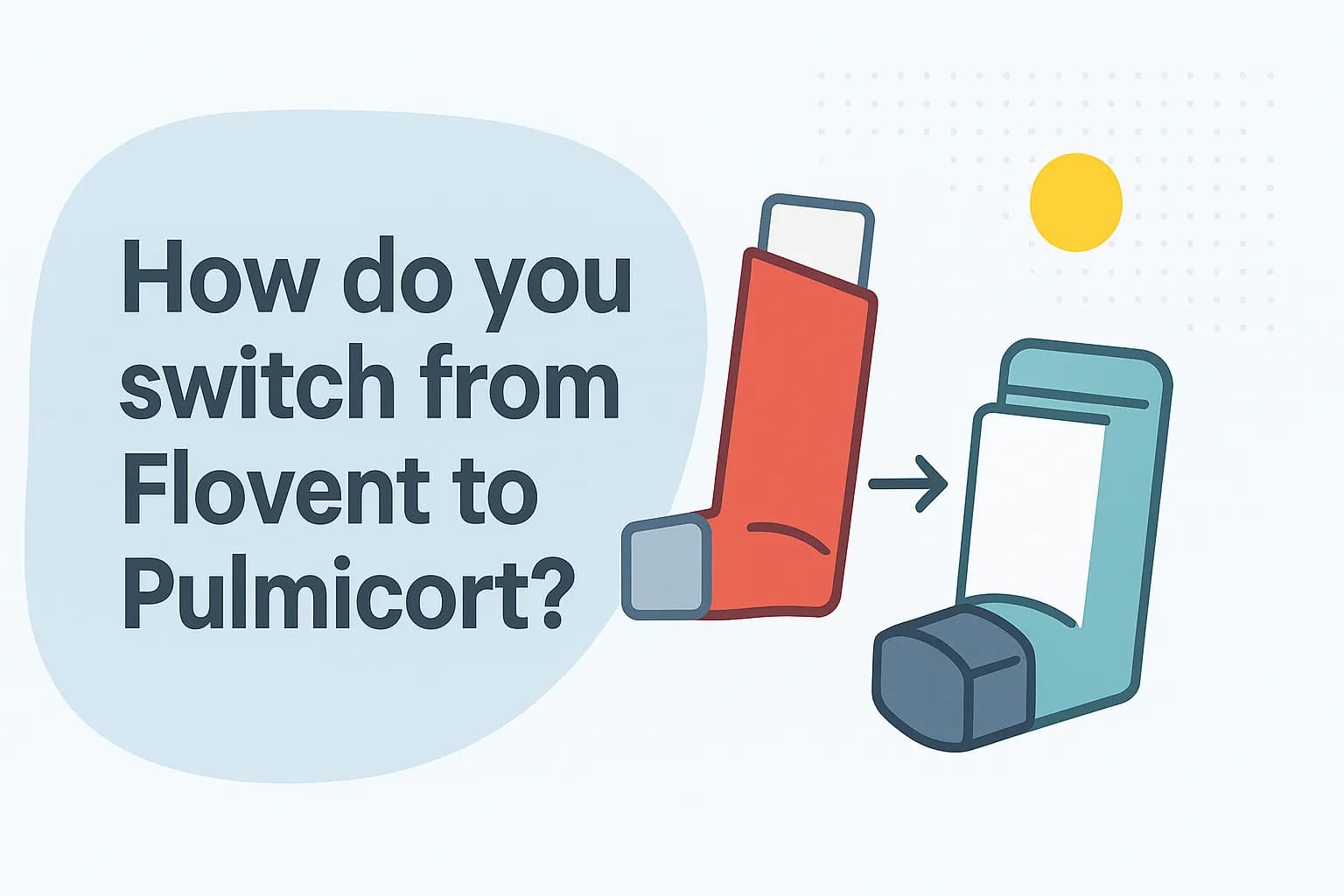Why has Flovent been discontinued?

A popular asthma inhaler Americans have been using since the 1990s is leaving pharmacy shelves beginning this new year, and healthcare providers are worried that you may have a difficult time switching to an alternative generic version if your insurance plan does not cover the new option.
In 2023, pharmaceutical company GlaxoSmithKline (GSK) announced the discontinuation of Flovent-branded products starting January 1, 2024. In their place, GSK is manufacturing an authorized generic version of both the Flovent HFA and Flovent Diskus inhalers. The new steroid inhalers, which are being distributed by Prasco Laboratories, are identical except they will have different branding and should be a lower price.
The authorized generic fluticasone, however, is not listed on many insurance company’s formularies and for those that do include it, it may not be listed as a preferred medication. This could mean you will need to switch to a different asthma medication or may have to work with your insurance provider to get the authorized generic version of Flovent covered.
What is Flovent?
Flovent contains fluticasone propionate, which is an FDA-approved inhaled corticosteroid used to manage asthma symptoms. It is also sometimes used off-label to treat eosinophilic esophagitis (EoE), a chronic allergic inflammatory condition of your esophagus that can lead to difficulty swallowing or vomiting. Flovent is not a rescue inhaler and should not be used to treat asthma attacks or sudden breathing problems.
It was available in 2 different products: Flovent HFA, a metered-dose aerosol inhaler, and Flovent Diskus, a dry powder inhaler. Both products came in 3 different strengths with the lower strengths approved to treat patients as young as 4 years of age.
What are the side effects of Flovent?
The most common side effects of Flovent include:
- Throat irritation
- Headaches
- Cough
- Nasal congestion
- Upper respiratory tract infection
- Sinus infection or swelling
- White patches in the mouth (thrush)
- Hoarseness
Rarely, Flovent may cause some serious side effects, including:
- Sudden narrowing of your airways and difficulty breathing
- Serious allergic reactions
- Vision problems
- Changes in your stress hormone (cortisol) levels
- Increased risk of bone loss (osteoporosis)
- Delayed growth in children
These are not all of the possible side effects of Flovent. Contact your healthcare professional for medical advice about any possible adverse effects you experience while using this medication. You can report your adverse effects to the FDA at 1-800-FDA-1088 or www.fda.gov/medwatch.
Is Flovent going off the market?
Yes, beginning January 1, 2024, GSK will stop making brand-name Flovent, and instead replace them with authorized generic versions of these medications.
“These authorized generics will provide patients in the US with potentially lower cost alternatives of these medically important products,” said GSK, and they are confident that the transition “will not have an impact on our ability to supply the market and we expect minimal disruption for patients.”
The move to authorized generics could be a way for GSK to avoid penalties from the American Rescue Plan’s Medicaid Rebate Program. Under the new law, GSK would have been required to pay states higher Medicaid rebates tied to the medication’s price increases. GoodRx reports that the price of a Flovent inhaler has increased by around 50% over the past 10 years.
Depending on your insurance coverage and pharmacy benefits, this could potentially save you money if the generic alternatives are covered. Many insurance companies may not cover these new medications though. CVS Caremark, a major pharmacy benefit manager, prefers a branded inhaler, Pulmicort, instead of generic Flovent. This is typically because of rebates its manufacturer, AstraZeneca, pays to obtain better insurance coverage. Contact your insurance company weeks before you are out of Flovent to see what is covered and how much your copay will be. This will give you time to get a new prescription for an alternative medication from your doctor, if needed, and get it filled.
What will replace Flovent?
Flovent is an inhaled steroid that has been around for decades. GlaxoSmithKline (GSK) has been manufacturing Flovent HFA since 2004 and Flovent Diskus since 2000, with that coming to an end at the start of 2024. They are being replaced by authorized generics of these products from GSK.
What will the difference be with these new authorized generics? According to the FDA, an authorized generic medication is commonly used to describe an approved brand name drug that is marketed without the brand name on its label. Authorized generic tablets or capsules may be a different color or have different markings on them. They are considered to be therapeutically equivalent to their brand-name drug because it is the same drug. Authorized generics are typically made in the same manufacturing facility as the brand-name drug. In the case of Flovent, their authorized generics will be manufactured by GSK, will contain the same active ingredient in the same strengths, use the same device, and will be taken the same way as their brand-name version.
What can I take instead of Flovent?
It is important that you do not run out of your asthma control medication. It needs to be taken consistently to help prevent breathing problems and asthma attacks. You should check with your insurance coverage to see if the authorized generic of Flovent is covered ahead of time just in case you need to switch medications. There are several other inhaled corticosteroid inhalers that your doctor can prescribe that may be covered. These include:
- Arnuity Ellipta (fluticasone furoate)
- Pulmicort Flexihaler (budesonide)
- Qvar (beclomethasone)
- Asmanex Twisthaler (mometasone)
- Alvesco (ciclesonide)
There are also combination inhalers that may work for you, including:
- Breztri (budesonide/glycopyrrolate/formoterol)
- Symbicort (budesonide/formoterol)
- Breo Ellipta (fluticasone furoate/vilanterol)
- Trelegy Ellipta (fluticasone furoate/umeclidinium/vilanterol)
If you have to switch medications, have your doctor or pharmacist show you how to use your new inhaler. Also, be aware you may use it more or less often than you were using Flovent. Be sure you understand your dose and how to use your inhaler to ensure you are taking the medication correctly.
Is there a shortage of Flovent?
GlaxoSmithKline (GSK) notified the FDA in June 2023, that they were discontinuing brand-name Flovent HFA and Flovent Diskus products. These branded products were no longer available to be ordered after December 31, 2023. It is anticipated that the supply of these brand-name products will be out of stock in early 2024. GSK replacing them with authorized generics of Flovent HFA and Flovent Diskus, which may also be available.
Check with your pharmacy to see if they still have the brand-name products or authorized generics on their shelf before your current inhaler runs out. You should also check with your insurance company to determine if the authorized generic is covered. If it’s not, talk with your doctor to see which asthma medication that is covered will be right for you.
Does Flovent need to be tapered?
Yes, you should not suddenly stop using your Flovent inhaler unless you’re advised to by your doctor. Suddenly stopping your Flovent inhaler can lead to breathing problems. You may start wheezing or feel short of breath. Your chest may feel tight and you could start to cough. If you want to come off an inhaled corticosteroid (ICS) such as Flovent, guidelines recommend 25% to 50% dose reductions at 3-month intervals. This has been determined to be safe for most people but should be done under the supervision of your doctor.

